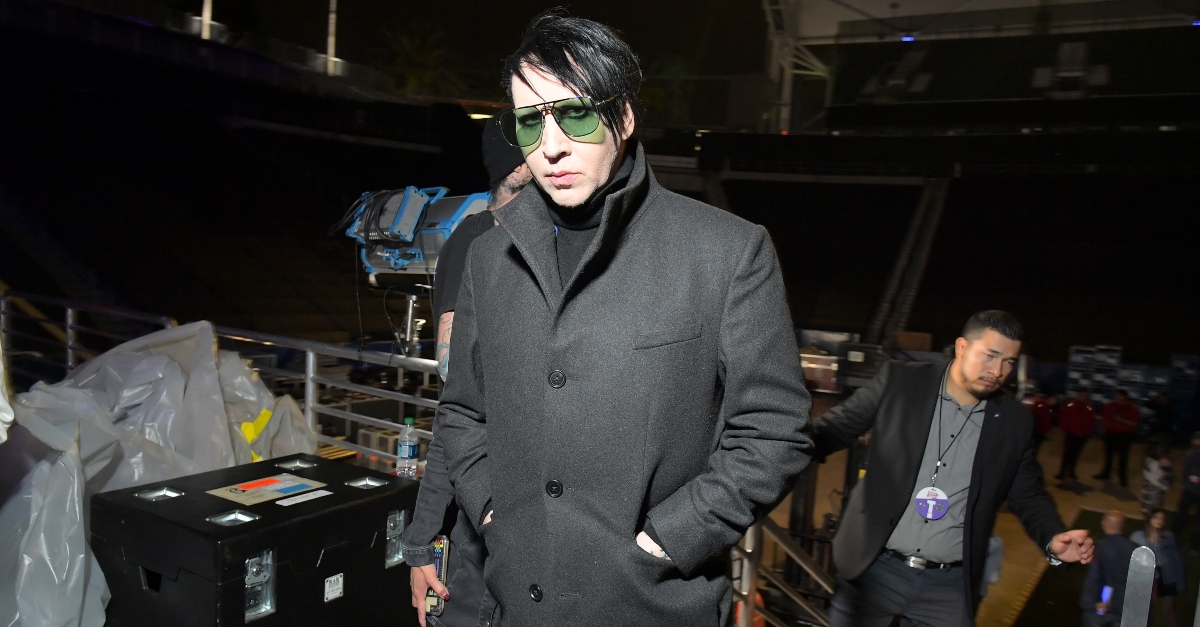
A California judge has dismissed a sexual harassment and battery lawsuit against rocker Marilyn Manson brought by his former assistant, and she will not be allowed to refile her case.
Ashley Walters sued Manson—born Brian Warner—in May of 2021, alleging sexual harassment, abuse, sexual battery, intentional infliction of emotional distress, and wrongful termination.
Walters, who worked as Manson’s assistant between 2010 and 2011, says that Manson lured her into an abusive situation after he discovered her on social media.
“Warner set out to groom Plaintiff by building trust, dangling professional opportunities, and gaining access in order to ultimately manipulate and exploit her to the point that she was treated like property and offered up to sexually please Warner’s famous friends and business contacts,” the complaint says.
According to Walters, Manson forced her to work excessive hours and subjected her to violent and angry outbursts. She also alleges that he forcibly kissed her.
Lawyers for Manson, 53, had challenged Walters’ timeline, specifically as to why she didn’t file her complaint within the two-year statute of limitations.
Walters said that one reason for the delay was that she had repressed her memories of the alleged abuse.
“Plaintiff was unable to recall many of the physical and emotional abuses until the Fall of 2020 when countless repressed memories flooded back to Plaintiff after meeting numerous other victims of Defendants and obtaining counseling from a mental health professional,” Walters’ complaint said.
Walters had argued that an amendment to California law that expanded the statute of limitations to 10 years should apply to her case. That law was meant to allow abuse survivors more time to file a complaint in cases where they weren’t aware that they were, in fact, being abused.
Manson’s lawyers argued that there was evidence to show that Walters did, in fact, know that the alleged abuse was happening at the time.
Los Angeles Superior Court Judge Michael L. Stern sided with Manson and issued his order after hearing oral arguments on Wednesday.
“[Manson’s motion] is Sustained without Leave to Amend,” the order said. “The claims are not applicable to the delayed discovery rule, plaintiff fails to plead sufficient facts to invoke this rule.”
Stern ordered Walters’ amended complaint, filed in March, to be “dismissed with prejudice.”
Stern’s order also said that the “new legislation” that expanded the statute of limitation for victims who may not have been aware at the time that they had been abused “is not retroactive” and doesn’t apply to Walters’ case.
In a statement, Walters said she was disappointed, but she remains steadfast and stands behind her allegations.
READ RELATED: Hamish Blake and Andy Lee remain Australia’s most popular podcasters
“Nobody gets to choose exactly how they process abuse or threats,” Walters said. “I am disheartened in the court’s decision today not just for my case, but for the message it sends to other survivors out there trying to balance how they process abuse with arbitrary court deadlines. We will not let this hurdle stop us from shining a light on what happened to me and others.”
Attorneys for Walters told Law&Crime that Stern’s ruling could have a drastic impact on survivors of domestic abuse.
“We are deeply disappointed in the court’s decision today,” a representative for law firms Valli Kane & Vagnini LLP and Hadsell Stormer Renick & Dai LLP told Law&Crime in an email. “If allowed to stand, this decision would drastically limit the ability of victims of abuse to obtain justice through the legal system.”
Walters’ lawyers say their client’s case isn’t over.
“We clearly pleaded the facts of this case in the complaint detailing the trauma and abuse Ashley endured, which prevented her from coming forward sooner,” the firms’ representative told Law&Crime. “While the court based its decision on the timeliness of Ashley’s claims and not the merits, we disagree with the court’s interpretation of the law as it applies to equitable estoppel and the delayed filing of abuse claims. We remain confident that a full review of the facts in this case will result in a successful appeal, which we plan on filing.”
Under California law, a party has 60 days to appeal a ruling.
Walters’ allegations are just one of several made in recent years against the one-time chart-topping “shock rocker” known for his goth persona and moody music.
In February of 2021, actress Evan Rachel Wood—Manson’s former fiancée—posted on Instagram that Manson had assaulted her during their relationship from 2007 to 2009.
“He started grooming me when I was a teenager and horrifically abused me for years,” said Wood, who had previously testified about surviving sexual assault before a House committee in 2018. “I was brainwashed and manipulated into submission.”
After Wood came forward on Instagram, four other women—Walters, Sarah McNeilly, Ashley Lindsay Morgan, and a woman identified only as Gabriella—also said Manson sexually assaulted them.
In May of 2021, Game of Thrones actress Esme Bianco sued Manson over an alleged pattern of sexual abuse, accusing him of forcing her to stay at his home, where he had her take drugs and alcohol, threatened her, and beat her with a whip Manson allegedly said was used by Nazis.
Manson’s name also emerged at the start of the defamation trial of Johnny Depp against ex-wife Amber Heard, when Heard’s lawyer J. Benjamin Rottenborn said Manson and Depp would go on drug- and alcohol-fueled binges.
Read Walters’ second amended complaint, below.
[Image via Charley Gallay/Getty Images for iHeartMedia]
Have a tip we should know? [email protected]
Source:





